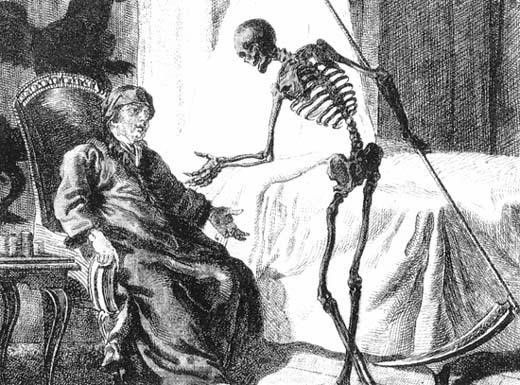“If I have come to the conclusion that the fear of death is illogical, why do I still fear death?” (Herbert Fingarette)
Thank you, Dave Boyo Klier, for a considered question.
Uncharacteristic though it may be for a philosopher, I think I can provide a rather straightforward answer. Indeed, it does make sense that you fear death, even if logically you shouldn’t. This “logically” is key to understanding the reason behind my answer.
Epicurus, the Hellenistic philosopher, once said: “When we exist, death is not; and when death exists, we are not.” There are many arguments against the fear of death, but this, in my opinion, is the most logical of all. It relies on the logical assumption that if something is true, then its opposite must be false. In this context, I, a living human being, am the “something” in question; and death, being the end of myself as a living human being, is its opposite: therefore, when my death comes, I will not be here to experience it – and for this reason, it does not make sense for me to fear it. I can fear harm threatened to me or those I love, or the loss of certain pleasures, because I do experience those things, and they impact my life – I am there when they happen. However, when my death occurs, I am no longer alive, so it shouldn’t bother me.
While this reasoning may sound convincing, it might not be too comforting to us actual living beings. This is because logical thinking has its limitations when applied to people’s behavior. People do behave irrationally, after all, often acting in sharp contrast to whatever the “logical” course of action may be. However, in my opinion, fear of death is somewhat different from the garden-variety irrational behavior. To understand this, let us turn again to ancient Greece – specifically, to the origins of the word “logic”.
The words “logic”, “language”, and “intelligence” all have an etymological ancestor in the Greek name lògos (λόγος) and the Greek verb lègo (λέγω). The first means “word” or “speech”, whereas the latter means “to speak” or, more interestingly, “to put in order” or “to arrange”. The connection between language, speech, and the ordering of the world is an ever-present theme in Greek mythology and philosophy, as well as in early Christianity. Language, and logic with it, can be understood as a way of ordering the world, grasping the things and events that surround us, and facilitating our interaction with them. Language and logic are a fundamental aspect of the human experience, an essential part of our being alive.
This may shed light on why we fear death, even though it is illogical. We fear death because it is impossible to grasp with the tools of logic and language. Logic and language are part of the human way of life; but when death occurs, they are no longer there. Since we are living beings, and language and logic enable our way of life, death, which is the absence of life, falls beyond the bounds of logic – this is what causes us to fear it.
What do you think? If death is illogical, why do we still fear it? Let us know in the comments.
If you have a question for the Armchair Philosophers, don’t hesitate to get in touch. You can find us on Twitter (@armchair_o) or fill in this form.
Be sure to check out our podcast!
If you like what we do, you can support us by buying us a coffee!
Image: A European depiction of Death as a skeleton wielding a scythe
I did my BA in Rome, Università La Sapienza, where I graduated with a thesis about the contemporary debate on personal identity. I am now doing my Research Master’s in Philosophy of Mind at Radboud University, Nijmegen, The Netherlands. I am specifically researching how digital environments (and especially social networking sites) influence our understanding of the world and of others. I like Wittgenstein and theories of extended cognition, which argue that items external to the brain can constitute cognitive processes. I am fascinated by the idea of the cyborg and how the digital revolution is changing our understanding of the world.


interesting read. I greatly appreciate your view. What I found most interesting is that you address that it is illogical. I much agree with your view from Epicurus. I also think the Stoics have something to say about how logical death is to fear. However, you brought up an interesting point, and maybe my interpretation is what you intended on, and if my thought is not what you intended on, please correct me, but I think this is a very interesting way to put it; we are humans, humans do illogical things. These illogical things arise because we are not only logical animals, but also emotional. Fear is an emotion. And so, our fear is illogical because fear itself is not a logical, but emotional thing to deal with. Even if we recognize death as illogical, we still fear it out of emotion, not out of logic.
If this is not what you were thinking, again, correct me, however, seeing as this is the thought I got when reading it and it very much sheds some light on the issue for me, I have got to agree with this.
Thanks for taking the time to respond to my question!
Dear Dave,
Thank you for your reply. I do agree that human beings are both rational and emotional animals: however, I don’t think that these two aspects need to be considered in tension with each other. I think it is not just logical, but also rational to fear death, where rational does not mean “capable of seeing with absolute clarity” (as many Western philosophers do), but more as a form of action-responsiveness to things that happen in our environment (more in line with Dan Dennett’s idea of the concept).
Responding emotionally to some things, like the possibility of death, is illogical (because our logic cannot grasp it). However, the emotion we feel can also be understood “rationally” – if one fears death, it is justified, or it makes sense, to do so. This happens because death stands outside of the reach of our logic: it is an experience that cannot be grasped. So, more than saying that we fear death because of our emotion, and not because of our logic, I would be more inclined to say that our fear of death is CAUSED by the shortcomings of our logic. Emotion and logic, the way we feel and the means of our thinking, can interact with one another, and I don’t think they should be considered as mutually exclusive – as you point out, human beings are both emotional and rational.